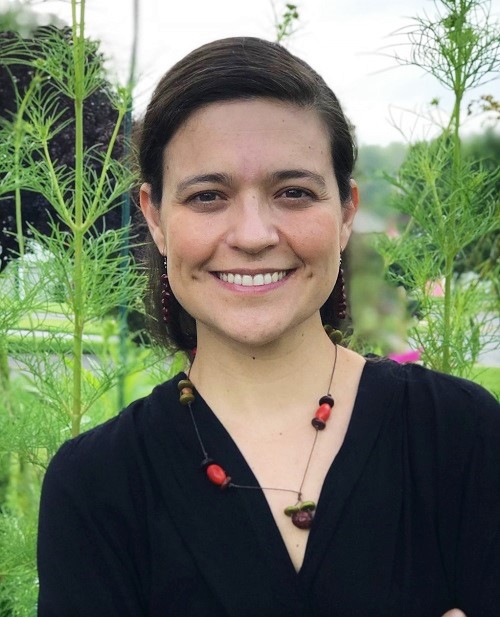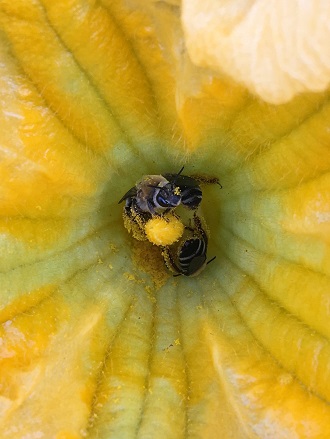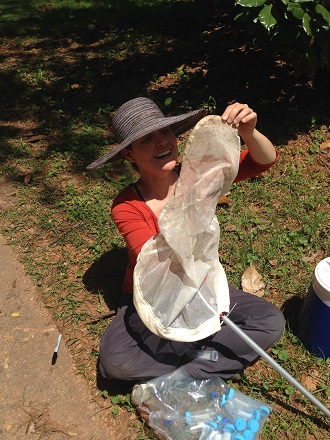About the department:
I am an Assistant Professor in the Department of Entomology at Penn State University with a research and extension appointment. Because of my role as a pollinator extension specialist, I don’t teach undergraduate and graduate students. Instead, I teach beekeepers and growers about diverse fundamental and applied topics related to pollinators. I am also cross-appointed in the Intercollege Ecology Program at Penn State.
About the research:
My research program focuses on understanding how evolutionary history, ecological interactions and human management influence bee population responses to the unique biotic and abiotic conditions of agricultural ecosystems. My team is interested in understanding how crop domestication and agricultural intensification have facilitated rapid evolution in pollinator populations. Besides answering fundamental questions about the ecology and evolution of bees, we aim to generate information that will help develop improved management and breeding programs of crops and pollinators. The research in my lab focuses on two model systems: honey bees (domesticated/managed) and squash bees (wild specialist pollinators of Cucurbita crops).
What has been the biggest challenge as a new PI so far?
Learning how to manage a lab, advise students, supervise staff, oversee budgets and accounts, and handle my own time, especially when there are always more and more things to do. How to be a good manager is not something that graduate school trains you for.
What has been the biggest surprise so far about being a new PI?
Finding out what it actually means to be a PI: managing, advising, supervising, but also dealing with politics. On the other hand, another big surprise has been to see the development of a vision for my research and extension programs. This is something that we are asked for when we are applying for jobs, and to be honest, I did not have a solid idea of what I truly wanted to work on before I started my job. I have been developing that vision as I go and it has been shaped by new collaborations, student’s interests, and funding opportunities. I think the acquisition of a longer-term vision for my academic career has been a fun and important thing to develop as a new PI.
How have you prepared to be a PI?
I am still learning how to be a PI. As I said before, I do not think grad school fully prepares you for the job. Grad school prepares you to be a scientist (do quality research, write compelling proposals and papers, and teach) but it does not prepare you to deal with all the other things that it means to be a PI (account, people’s management, etc). I do wish could we start incorporating more formal training on all of these other aspects that are necessary to be a PI to holistically prepare Ph.D. students to be good at it!
How do you/will you approach mentoring new lab members?
Mentoring is one of the best parts of my job. I have a big lab and I am still learning how to be a good mentor. Mentoring is different for each student and it is a constant learning process. I meet with all my students every 2 weeks individually and we discuss progress on all ongoing projects. We alternate weeks of individual meetings with lab meetings. When we meet as a lab we have peer-review sessions or skill development short workshops. I’ve had different formats for lab meetings every year since I started my lab. To mentor students on project development, I usually give all first-year students a small project to get started with. I try to give them projects that align with their interests and previous experiences. Then, I expect each student to build on this initial project and develop a more independent project for the rest of the dissertation. For the most part, this strategy has worked out pretty well. Having a big lab brings an added value to interactions between members of the lab. In our group, students and postdocs talk a lot to each other and those interactions really help them advance in their projects and brainstorm about cool ideas for future projects. The downside of a big lab is that there is less time for one-on-one with each member of the lab.
Are you recruiting? If so, how do you/ will you choose new lab members?
I am not actively recruiting because of the large size of my lab. However, I always consider applications from students who have interests that align well with the goals and vision of my group.
When and why did you become a SSE member?
I have been a member since 2011. I became a member because of my interest in questions in ecology and evolution. My dissertation work was on phylogeography and population genetics. The Evolution meetings offer a great opportunity to learn where the field is, and what others are working on. I also became a member because of the funding opportunities for grad students.
What does becoming a SSE member mean to you or your career?
It has provided a great opportunity to network. Because I have been associated with departments of Entomology since I was a grad student, I have been very active in the Entomology Society of America meeting in recent years. It’s been difficult to go to so many meetings every year. I miss the Evolution meetings though so I plan to attend the one in Cleveland this year.
Do you have a funny story to share from an Evolution Meeting?
My first evolution meeting was in Norman, OK. I took a taxi from the dorms to the conference and when the taxi driver heard I was going to the convention center, he asked me if I was one of those crazy people who *believed* in evolution (!).
When was your first Evolution Meeting, and how did it affect your career?
It was in 2011 in Norman OK. I remember enjoying every talk I listened to. This does not happen in every scientific meeting :)
Do you remember your first publication in Evolution or Evolution Letters (acceptance or rejection)?
I have never published in Evolution or Evolution Letters. This is a goal that I have for the near future.
If you could meet one other SSE member for the first time, who would it be and why?
Loren Rieseberg. I am a fan of his work.
Besides research, how do you promote science?
I try to write an extension article or blog for every scientific paper that we publish in the lab. This is a way to communicate the findings of every paper to a much broader audience. Some of these follow-up articles are published in trade magazines that are read by beekeepers and growers every month.
Do you teach evolution? What concept blows students’ minds?
I don’t teach students. However, when I am constantly giving extension talks and I tell beekeepers and growers about the types of inferences that can be made from genetics markers, they are always shocked.
Are you involved in evolution outreach? Tell us about it.
No. I do a lot of outreach but not specifically about evolution. However, I do talk about the results of my research on historical demography and population genetics of bees when I give extension talks. Many of the participants of these talks and workshops are always amazed by the type of inferences that can be drawn with genetic data.
How do you think evolutionary research benefits society?
Evolutionary theory is fundamental to understand the biological world as it is constantly changing. This is important for medicine, agriculture, conservation, and beyond. Indeed, I think that my background in evolutionary biology is highly relevant to my work as an extension specialist in agricultural pollinators (even though most people don’t see the direct link between the two fields).
How do you advocate for diversity and inclusion in academia and your workplace?
Working on topics of diversity and inclusion has been one of my goals as a faculty member. As I have moved up the academic ladder, it has become increasingly evident that the standards in academia are dictated by a dominant culture that often does not welcome or value traits from people that do not historically “belong” to academia. As chair of the new Diversity and Inclusion committee in my department, I am actively working on generating opportunities to increase awareness about these topics and to help build a more inclusive environment. I am very passionate about this topic and I value the efforts that SSE is taking in this front.
Do you have a time management tip to share?
Have a calendar (this is a must). Make a list of daily, weekly, monthly and semester goals. Block at least one hour (more if you can) of productive writing every day.
What is your favorite app?
Google drive and Evernote.
Do you have a favorite science podcast or blog?
I love the Molecular Ecologist and Small Pond Science.
What book should every evolutionary biologist read?
For sure, On the Origin of Species. My textbook for evolution during college was Evolution by Douglas Futuyma. That book provided a great foundation for concepts. I read it from cover to cover.
What one piece of advice would you give to a starting graduate student?
Work hard but have fun! Enjoy what you do during grad school. It is demanding but it is a time of growth and so much learning. Surround yourself by positive and constructive people. That will help you overcome some of the difficulties of navigating the academic world. Besides faculty mentors, have more senior grad students and postdocs as mentors.
What one piece of advice would you give to a postdoc?
Try to gain different skills from the ones you have. This is usually tough because postdocs usually get hired for the skills that they have and what they can bring to projects. Increasing your skill set will increase your “marketability” for academic jobs. My postdoc years were the best time to focus on research and work on what I really enjoyed. Best time of my academic career!
How was your first faculty meeting?
It was ok but intimidating. It took me a while to mentally transition from being a postdoc to being an assistant professor and see many of the big names in my department as colleagues.
Did you ever have something go wrong in a talk?
Yes. Once, I gave a talk where all the figures were upside down in the powerpoint. It was terrible. I did my best to explain the figures but I am not sure I did a good job with it. It was a short talk though so the uncomfortable situation did not last too long.
Do you remember making any mistakes as a trainee; how did you recover?
Many! I just kept trying until things worked out. I also used to seek a lot of help from more senior grad students. I had many wonderful senior grad mentors throughout my career.
What is something most people don’t know about you?
I discovered my passion for bees in my junior year in college. I used to be afraid of bees and most insects as a kid.
What do you enjoy doing in your free time?
I definitely prioritize spending time with my family (husband, 3 kids and parents) when I am not at work. I also try to exercise every day (running and now boxing) and going out salsa dancing whenever I can!
 Margarita Lopez-Uribe
Margarita Lopez-Uribe
